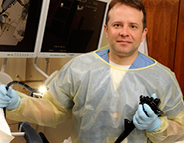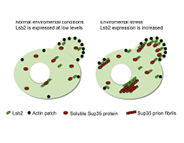 |
 |
|||||||
| August 5, 2011 | Research Extras Visit the new website for the Center for AIDS Research (CFAR) to learn about research, scientists, and core laboratories, and to find collaborators, services, and connections. Learn all about the WHSC and its components and get facts and figures for 2011 in the online At a Glance. Explore essential basic and translational research at Yerkes National Primate Research Center, one of eight NIH-funded primate centers and a key component of the WHSC. Read Emory Extension magazine, a publication of the Division of Physical Therapy in the Department of Rehabilitation Medicine. Browse a database of federally and privately supported clinical trials at Emory and other institutions at the NIH website clinicaltrials.gov Check out Emory Health Source, a monthly consumer newsletter from Emory Healthcare. |
|||||||
|
Field Willingham, MD, MPH |
||||||||
Sound Science: A Hybrid Approach to Ousting Esophageal Tumors |
||||||||
|
Triple-negative breast cancer cells overproduce EGFR, which is stained brown.
|
||||||||
| Blocking the Escape Route for Triple Negative Breast Cancer Triple negative breast cancers are so named because they lack three biomarkers that make other breast cancers vulnerable to drugs. Researchers are using a clinical trial to test a combination of drugs that has shown promise in the laboratory. The drugs work by tricking cancer cells into a dependence on a particuar pathway, then attacking. Read more... |
||||||||
| Progesterone Halts Neuroblastoma in Lab Research High doses of progesterone were found to kill neuroblastoma cells in mice while leaving healthy cells intact. More research is needed to find the optimal dose of progesterone, whether it should be combined with other therapies, and whether it's effective against other types of brain cancer. Neuroblastoma is the most common form of cancer affecting young children. Read more... |
||||||||
| Solving the Mystery of Stillbirths The tragedy of stillbirth, which affects 26,000 U.S. pregnancies a year, is still not well understood. But as part of the largest population-based study yet, Rollins School of Public Health researchers are identifying risk factors including obesity, age, blood type, genetics, and stress. Screening tests also may help identify risk for stillbirth in time to prevent it. Read more... |
||||||||
|
Environmental stress increases Lsb2 expression in yeast cells.
|
||||||||
| Stressed Cells Can Promote Prion Formation Prions are clumps of misfolded proteins that cause devastating neurodegenerative diseases, such as mad cow/Creutzfeld-Jakob disease in humans and animals. Prions require a trigger, however, and scientists have found a yeast protein that promotes prion formation when cells are stressed. The discovery could lead to better understanding of the role of aggregated proteins in diseases such as Alzheimer's. Read more... |
||||||||
 |
 |
|||||||




